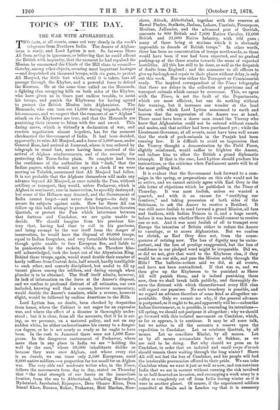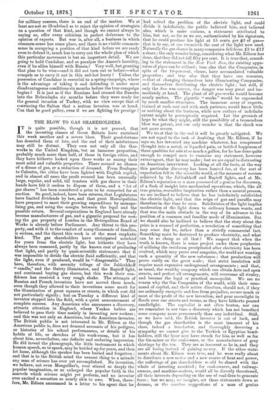TOPICS OF THE DAY.
THE WAR WITH AFGHANISTAN.
TWO facts, at all events, come out very clearly in the week's telegrams from Northern India. The Ameer of Afghan- istan is ready, and Lord Lytton is not. So far vwas Shere Ali from acting in ignorance, or believing that he could affront the British with impunity, that the moment he had repulsed the Mission he summoned the Chiefs of the Hill clans to council— thereby, among other objects, securing most important hostages —and despatched six thousand troops, with six guns, to protect All Musjeed, the little fort which, until it is taken, bars all passage through the Khyber, and a powerful force to defend the Koorum. He at the same time called on the Momunds, a fighting clan occupying hills on both sides of the Khyber, who have given us in times past endless trouble, to assist his troops, and punish the Khyberees for having agreed
to protect the British Mission into Afghanistan. The Momunds, who can turn out 15,000 daring brigands, obeyed his summons, and we suspect that the rumours of an " Afghan attack on the Khyberees are true, and that the Momunds are punishing their treason to Islam with fire and sword. This daring move, which is virtually a declaration of war, and renders negotiation almost hopeless, has for the moment checkmated the Government of India. It had been decided, apparently, to seize Ali Musjeed, and a force of 5,000 men, under General Ross, had arrived at Jumrood, where it was ordered by telegraph to stand fast, news having been received of the arrival of Afghan reinforcements, and of the necessity for protecting the Trans-Indus plain. So complete had been the confidence of the authorities in this "dash," that the Indian papers, which would not expect a check if we were moving on Tobolsk, announced that Ali Musjeed had fallen. It is not probable that the Afghans themselves will make any advance beyond All Musjeed, as once outside the Pass, without artillery or transport, they would, unless Peshawur, which is Afghan in sentiment, rose in insurrection, be speedily destroyed; but some of the Hillmen may descend, and the Government of India cannot forget—and never does forget—its duty to secure its subjects against raids. How far Shere All can follow up this bold attempt to protect his frontier, can threaten Quettah, or protect the Pass which intervenes between that fortress and Candahar, we are quite unable to decide. We should imagine from his previous his- tory that, having had time to call in his garrisons, and being exempt by the war itself from the danger of insurrection, he would have the disposal of 40,000 troops, equal to Indian Irregulars, and very formidable behind cover, though quite unable to face European fire, and liable to be panic-struck by the rockets, which, as Theodore him- self acknowledged, took the heart out of the Abyssinian King. Behind these troops, again, would stand double their number of hardy ruffians from Central Asia, half armed, hardly intelligible to each other, and scarcely disciplined, but useful to fill up vacant places among the soldiers, and daring enough when plunder is to be obtained. The Staff itself admits, however, its lack of information on the force at the Ameer's disposal, and we confess to profound distrust of all estimates, our own included, knowing well that a success, however momentary, would double the Ameer's numbers, while a reverse, however slight, would be followed by endless desertions to the Hills.
Lord Lytton has, no doubt, been checked by despatches from home, where the Cabinet is not eager for an expensive war, and where the effect of a disaster is thoroughly under- stood ; but it is clear, from all the accounts, that if he is act- ing, as we presume, on a matured policy, and not on any sudden whim, he either underestimates his enemy to a danger- ous degree, or he is not nearly so ready as he ought to have been. In the rush to Jumrood there were not 1,000 Euro- peans. In the dangerous cantonment of Peshawur, where more than in any place in India we are "holding the wolf by the ears," where 50,000 inhabitants dislike us because they were once Afghan, and where every riot is an dmeute, we can trace only 2,500 Europeans, amid 8,000 native soldiers.—a proportion far too small for an Afghan war. The very able and moderate writer who, in the Times, follows the movements from day to day, stated on Thursday that "the total strength of our forces on the immediate frontier, from the sea to Abbottabad, including Kurrachee, Hyderabad, Jacobabad, Rajanpore, Dera Ghazee Khan, Dera Ismail Khan, Bunnoo, Kohat, Peshawur, Hoti Mardan, Now- shera Attock, Abbottabad, together with the reserves at , Rawall Pindee, Sealkote, Jhelum, Lahore, Umritsir, Ferozepore, Mooltan, Jullunder, and the advanced post of Quettah, , amounts to 800 British and 7,000 Native Cavalry, 12,000 British and 21,000 Native Infantry, with 102 guns; , many of these being at stations which it is obviously , impossible to denude of British troops." In other words, there has been no concentration of troops northwards, as there would have been if war had been expected, and no gradual , pushing-up of the three armies towards the scene of expected hostilities. All this has still to be done, as well as the despatch of drafts from England ; and the summons to all officers to give up furlough and repair to their places without delay, is only out this week. Nor was either the Transport or Commissariat I ready. The inspired correspondent of the Times telegraphs that there are delays in the collection of provisions and of transport animals which cannot be overcome. This, we agree with the Times, is not the fault of the Departments, which are most efficient, but can do nothing without fair warning, but it increases our wonder at the loud fanfare with which Lord Lytton announced to earth and heaven that the suppression of the Ameer was at hand. There must have been a dozen men round the Viceroy who knew that Afghanistan could not be entered without camels and mules, and that neither had been purchased yet ; while the Lieutenant-Governor, at all events, must have been well aware that the stock of pack-animals in the Punjab had been running low. It is difficult to avoid an impression that the Viceroy thought a demonstration by the Field Force, slightly reinforced, would suffice to frighten the Ameer, and induce him to allow the British a grand diplomatic triumph. If that is the case, Lord Lytton should produce his instructions, or the criticism when Parliament meets will be of the most galling kind.
It is evident that the Government look forward to a cam- paign in the spring, or preparations on this side would not be so active, and we cannot entirely agree with Earl Grey in the able letter of objections which he published in the Times of Thursday. It was most foolish, unless we wanted a quarrel, and with it an excuse for "rectifying our frontiers," and taking possession of both sides of the Suleiman, to ask the Ameer to receive a Resident. It was still more foolish to send forward a grand Mission, all fuss and feathers, with Indian Princes in it, and a huge escort, before it was known whether Shere All would consent to receive one or not. And it was most foolish of all to trumpet over Europe the intention of Britain either to reduce the Ameer to vassalage, or to annex Afghanistan. But we confess we shrink, as Earl Grey does not, from the conse- quences of retiring now. The loss of dignity may be unim- portant, and the loss of prestige exaggerated, but the loss of confidence in our pledged word might be irreparable. Did we, or did we not, give that word to the Khyberee clan, if they would be on our side, and pass the Mission safely through the Hills ? The bulletin-writers said we did, at all events, and have not been contradicted. If that was so, and we then give up the Khyberees to be punished as Shere All will punish them, and is indeed punishing them now, then we shall break faith publicly, and thoroughly de- serve the distrust with which thenceforward every Hill clan will regard our prpmises. No such treachery is possible, and we regard an advance therefore of some kind as altogether un- avoidable. Only we cannot see why, if the general advance is postponed, as it ought to be, and apparently will be--unless the Indian Government, as is possible, is concealing its intentions— till spring, we should not postpone it altogether ; why we should go forward with this isolated movement on Candahar, which, so far as appears, is to continue. It may be all mere talk, but we notice in all the accounts a reserve upon the expedition to Candahar. Let us reinforce Quettah, by all means. Let us conciliate Khelat, by all means. Let us by all means accumulate force at Sukkur, as we are said to be doing. But why should we press on to Candahar, in order that an isolated and small corps d'arme'e should remain there waiting through the long winter Shere Ali will not feel the loss of Candahar, and his people will feel the intolerable provocation offered to their pride. We can take Candahar when we want it just as well as now, and can convince India that we are in earnest without running the risk involved in so half-hearted an invasion, and encamping a weak army in a valley as completely cut off from India during winter as if it were in another planet. Of course, if the experienced soldiers consulted at Simla and in London say that it is necessary for military reasons, there is an end of the matter. We at least are not so ill-advised as to reject the opinion of strategists on a question of that kind, and though we cannot always be saying so, offer every criticism in perfect deference to the opinion of experts. But war is, after all, a business in which common-sense has some place, and there is no visible common- sense in occupying a position of that kind before we are ready even to defend it, much less to carry out the whole plan of which this particular movement is but an important detail. We are going to hold Candahar, and so paralyse the Ameer's hostility, even if he allies himself with Russia.? Very well, but granting that plan to be wise—and it did not turn out so before—what compels us to carry it out in this red-hot hurry ? Unless the possession of Candahar is essential to a spring campaign, where is the advantage of taking it and defending it under most disadvantageous conditions six months before the true campaign begins ? It is just as if the Russians had crossed the Danube into the Dobrudscha six months before they were ready for the general invasion of Turkey, with no view except that of convincing the Sultan that a serious invasion was at hand. Can that be good policy, even if we are fighting for prestige ?



































 Previous page
Previous page